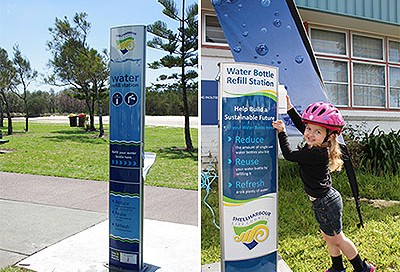Case Study
November 21, 2013
Supporting sustainable living by reducing plastic waste
Challenge: Finding innovative ways to achieve the communities strategic plan 2013-23 objective relating to practicing sustainable living.
Solution:
– Installing a permanent water refill station and drinking fountain at Reddall Reserve on the Lake Illawarra foreshore
– Providing portable water refill stations at Council’s major events in key public places.
Result: Taking a step closer to being a leader in Environmental Sustainability by supporting and encouraging the community to practice sustainable living by reducing plastic waste from disposable drink bottles.
Shellharbour City Council is committed to being a leader in environmental sustainability.
In 2013 Council decided to purchase a number of aquafil™ portable water bottle refill stations to use at major community events. The aim of the refill stations was to support the local community in practicing sustainable living, reduce waste to landfill and reduce stormwater pollution.
In 2012 Council took advantage of a funding opportunity from Keep Australia Beautiful through its Beverage Container Recycling Community Grants, to install a permanent aquafil™ water refill station and drinking fountain at a popular picnic area at Reddall Reserve, on the foreshore of Lake Illawarra.
Both initiatives encourage the consumption of tap water, which has a much smaller ecological footprint than bottled water. These initiatives also encourage people to bring their own drink bottles and embrace the ‘refuse, reuse’ philosophy rather than the ‘throw away’ mentality. By filling up reusable water bottles, Council and the community are reducing the amount of plastic waste that ultimately ends up in landfill, water ways and oceans.
The aquafil™ units come with a range of optional features and water meters were installed on both permanent and portable refill stations to calculate the ongoing environmental benefits associated with drinking tap water instead of bottled beverages.
In addition to the display panels which allow for advertising on the refill station itself, Council has also purchased flags which read ‘Water Refill’ to draw attention to the units at events.
“We have only recently started using our aquafil refill stations and already it’s great to see the environmental benefits accumulating as each bottle refilled at the station is potentially one less disposable beverage bottle that will be consumed.
“We’ve also found children have really enjoyed the novelty of refilling their water bottles from the special refill station,” says Alison Mellor, Environment Officer Shellharbour City Council.
Council has also adopted the Illawarra Regional Food Strategy which describes how Illawarra Councils can work together towards a vision for a vibrant, sustainable local food system that is resilient, prosperous, fair and secure. Making fresh drinking water available in public spaces is one of the actions identified in this strategy and the provision of water refill stations helps achieve this action.


